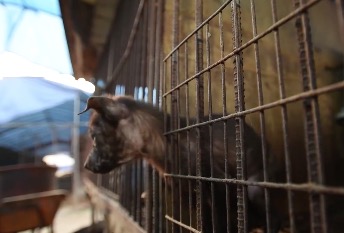Dozens of dogs rescued from a farm in South Korea where they were to be slaughtered for human consumption have been transported to the United States, animal advocates said.
Last week, animal rescuers with Humane Society International (HSI) found 55 adult dogs and puppies caged in near darkness and dire conditions at a dog meat farm in Goyang, a city just north of Seoul.
Animal rescuers thought they’d seen it all; then entered a SK dog meat where 55 dogs were kept in near darkness: https://t.co/6HoWBo35pA pic.twitter.com/ah5Oj48dJa
— Humane Society Int’l (@HSIGlobal) March 24, 2017
Although the Washington-based animal charity has rescued dogs from filthy, deprived conditions countless times before, Humane Society International said the farm in Goyang was unlike anything its rescue team had seen before.
The farm was an entirely indoor facility packed with barren pens and cages where dogs lived without daylight or fresh air, according to a press release from Humane Society International.
“In the more than two years that I’ve been part of our campaign to shut down the dog meat trade in Asia, I thought I’d seen it all until I first saw this facility,” Adam Parascandola, Humane Society International’s director of animal protection and crisis response, said in a statement. “It literally took my breath away, not least because when we first entered the darkness, the stench was overpowering. The ammonia burned the back of our throats. We could hear the dogs’ desperate barks but we couldn’t see their faces properly, just their eyes peering out.”
Parascandola continued: “As we became accustomed to the darkness, we saw the pitiful state these poor animals had been living in. The farm is right on the public path next to the train tracks, but the people walking by would never have known what suffering it concealed.”
It’s the seventh dog meat farm Humane Society International has closed in South Korea thus far, saving more than 800 dogs. Although the industry is diminishing and demand for dog meat has plummeted, some 17,000 dog meat farms still operate in South Korea, rearing over 2.5 million dogs each year for human consumption.
Humane Society International, which relies on private donations, deals directly with farmers in its global fight against the dog meat business and the animal charity helps owners financially to transition to other work.
Humane Society International said it reached an agreement with the family who owns the property to permanently close the dog farm and hand over all 55 dogs to the charity, so the animals could be flown to the United States for adoption into loving homes.
As with many dog meat farms, rescuers found a variety of breeds including miniature pinscher mixes, Jindo mixes, a great Pyrenees and golden retriever mix, a German shorthaired pointer, Shih Tzus, a corgi and Chihuahua mix and a Maltese mix. Some are suspected to be former pets, according to Humane Society International.
The animal charity chartered a flight to transport all of the dogs from Seoul to the United States. Forty-six of them arrived at John F. Kennedy International Airport in New York City late Saturday. From there, they went to emergency shelters in New York, Pennsylvania and Maryland on Sunday. The dogs will be put up for adoption after the shelters evaluate their behavior and medical needs to make sure each one is ready for a forever home, according to The Associated Press.
“These dogs have lived their lives so far in deplorable conditions, so we’re all really excited to be getting them out. Most appear to have had little human contact and many of them are understandably very frightened of people, cowering as we approach and trying to hide in corners,” Parascandola said in a statement. “But we know from experience that once we take them to a safe place and they feel secure and loved, they’ll learn to trust. Their capacity to bounce back from the worst situations is astonishing to me.”
—
Other Must-Read Stories:
– Princeton Rescinds Award From Tim Keller, Despite Having the SAME Views as the Award’s Namesake
– AMAZING: ‘Miracle’ Baby Born 16 Weeks Early Is Defying the Odds and Thriving


